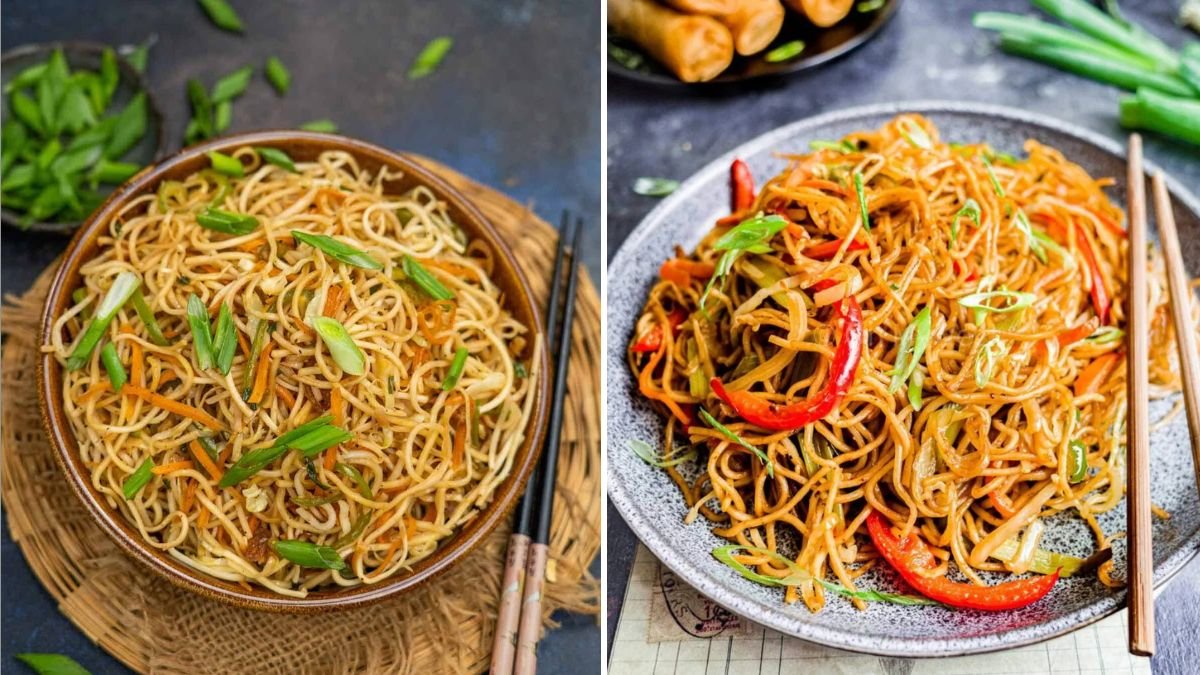If you’ve ever craved crispy noodles with a medley of colorful vegetables and savory sauces, then Vegetable Hakka Chow Mein is the dish for you. This Indo-Chinese favorite has become a go-to recipe for home cooks seeking a quick, flavorful, and satisfying meal. Perfect for lunch, dinner, or even a party platter, vegetable chow mein is loved for its crispy yet soft noodles, crunchy veggies, and the perfect balance of umami flavors.
In this step-by-step guide, we’ll show you how to make restaurant-style Vegetable Hakka Chow Mein at home, with tips to get the noodles just right and ensure your vegetables retain their crunch.
Step 1: Gather Fresh Ingredients
The foundation of any good Vegetable Hakka Chow Mein lies in fresh, crisp vegetables and quality noodles.
You will need:
- Noodles: Hakka noodles or thin chow mein noodles (about 200g for 2-3 servings)
- Vegetables: Cabbage (½ cup, shredded), carrots (½ cup, julienned), bell peppers (½ cup, thinly sliced), spring onions (2-3, chopped), and optional mushrooms or baby corn
- Sauces & Seasonings: Soy sauce (2 tbsp), chili sauce (1 tbsp), vinegar (1 tsp), black pepper (½ tsp), salt (to taste)
- Oils: Vegetable oil or sesame oil (2 tbsp) for frying
Pro Tip: Wash and chop all vegetables uniformly for even cooking and aesthetic presentation.
Step 2: Cook the Noodles Perfectly
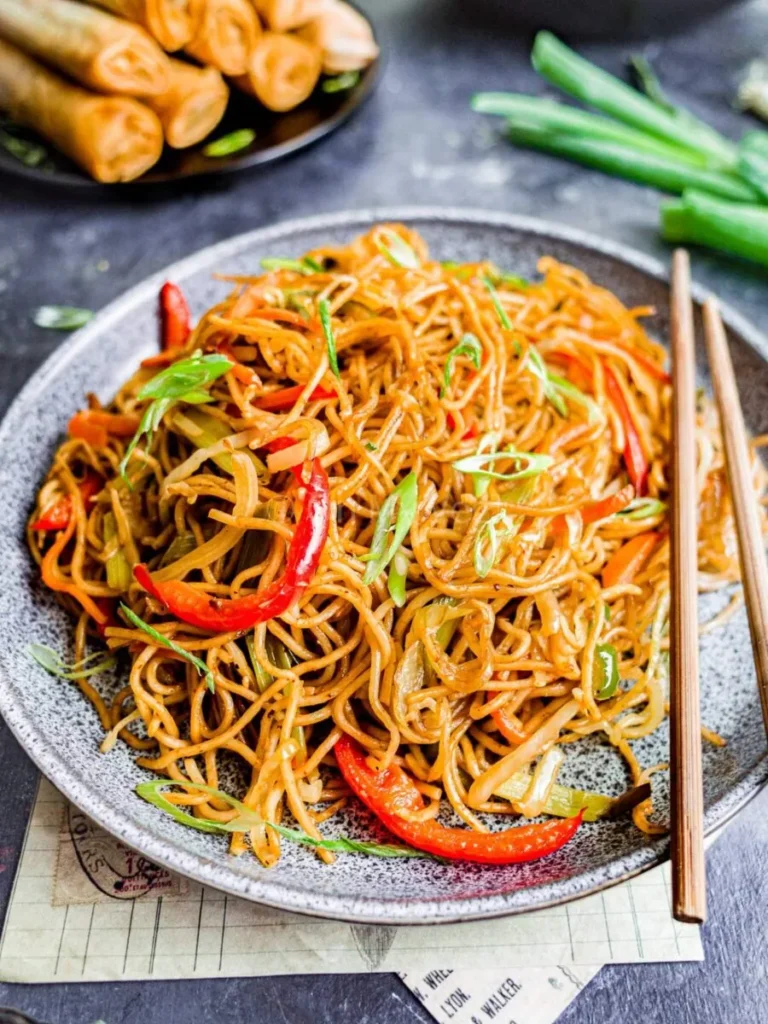
Cooking the noodles correctly is key to achieving the perfect chow mein texture.
- Boil water in a large pot with a pinch of salt.
- Add the noodles and cook for 2-3 minutes until al dente. Avoid overcooking.
- Drain and rinse under cold water to stop further cooking.
- Toss lightly with a teaspoon of oil to prevent sticking.
Pro Tip: Slightly undercooked noodles give the desired chewiness when stir-fried.
Step 3: Prepare the Veggies
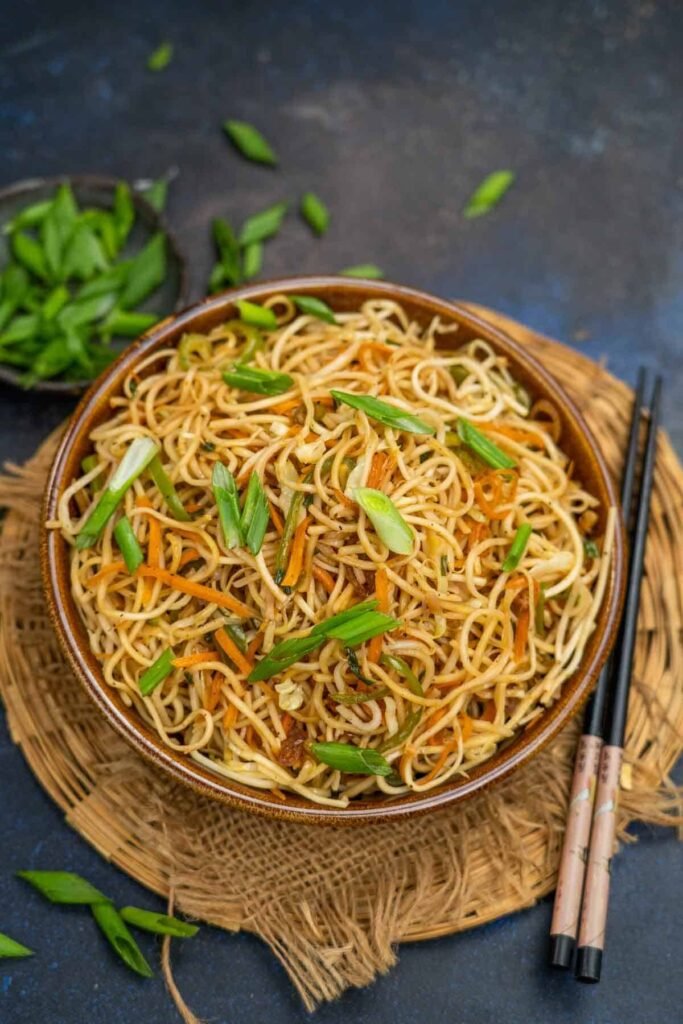
While the noodles cook, prep your vegetables for stir-frying:
- Julienne or thinly slice the carrots and bell peppers.
- Shred the cabbage finely to maintain crunch.
- Chop spring onions into 2-inch pieces for garnish and flavor.
Pro Tip: Quick-cooking veggies like cabbage and bell peppers retain crunch when stir-fried on high heat.
Step 4: Heat the Wok or Pan
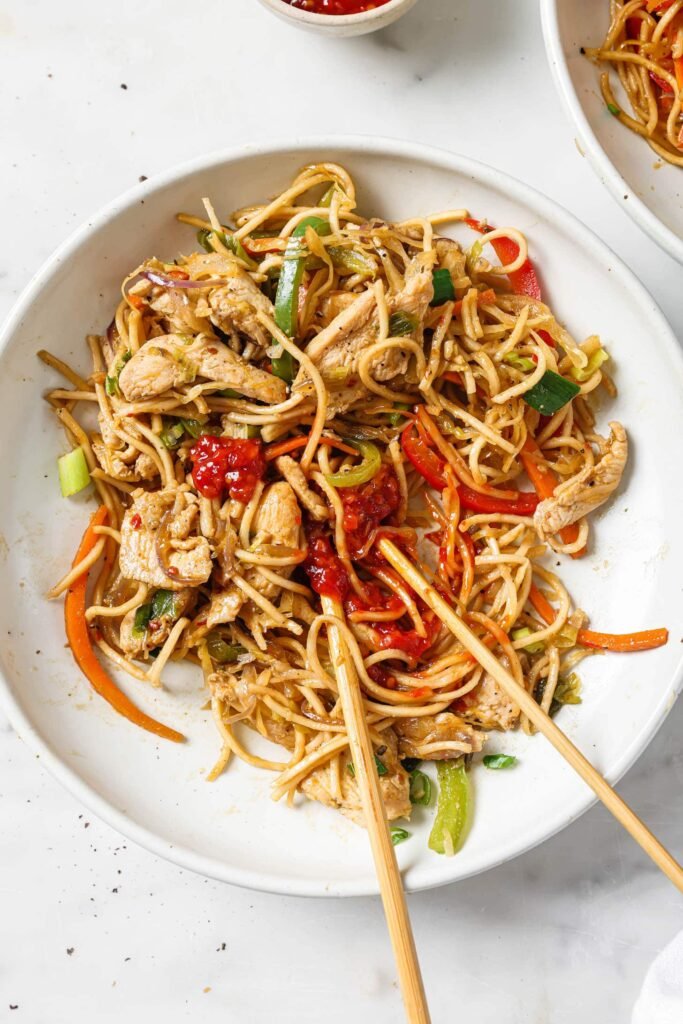
For authentic Hakka-style chow mein, using a wok is ideal.
- Heat 2 tablespoons of oil in a wok or large non-stick pan on high heat.
- Ensure the oil is hot before adding vegetables — this helps maintain color, texture, and taste.
Pro Tip: High heat is crucial for the signature slightly smoky flavor, also known as “wok hei.”
Step 5: Stir-Fry the Vegetables
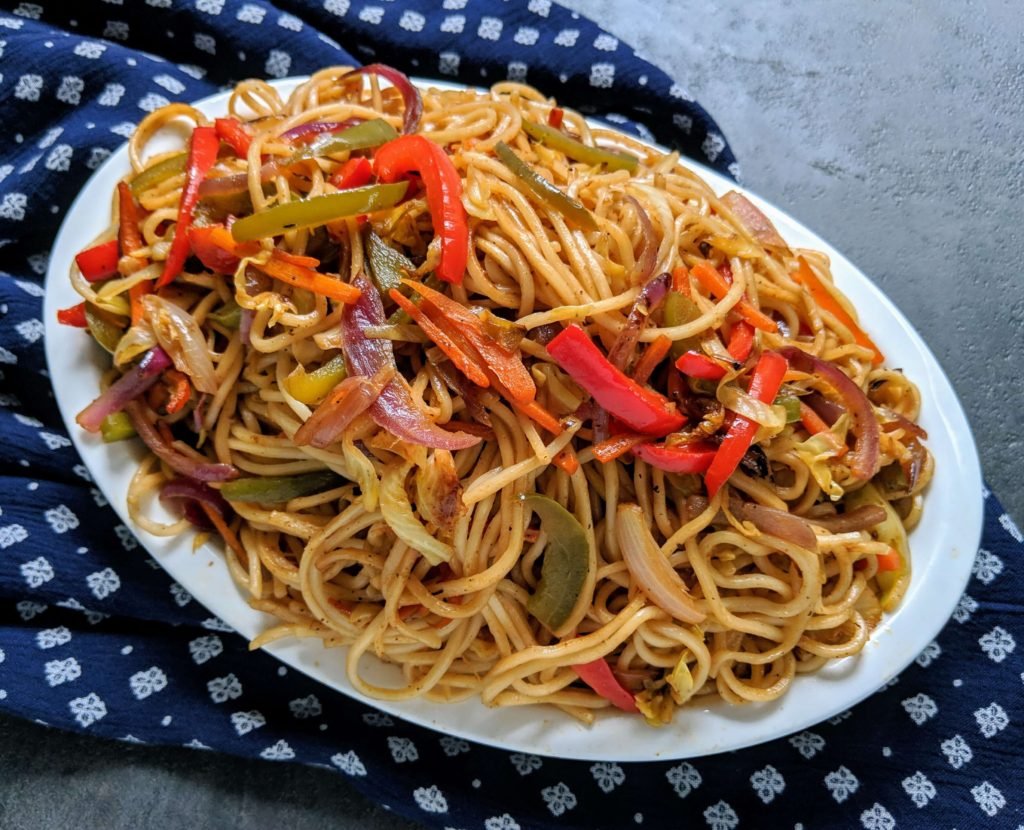
The vegetables are the stars of this dish:
- Add carrots and bell peppers first, stir-frying for 1-2 minutes.
- Add cabbage and mushrooms, continue tossing on high heat.
- Season lightly with salt and pepper.
Pro Tip: Avoid over-stirring — gentle tossing ensures vegetables stay crisp-tender.
Step 6: Add Sauces and Noodles
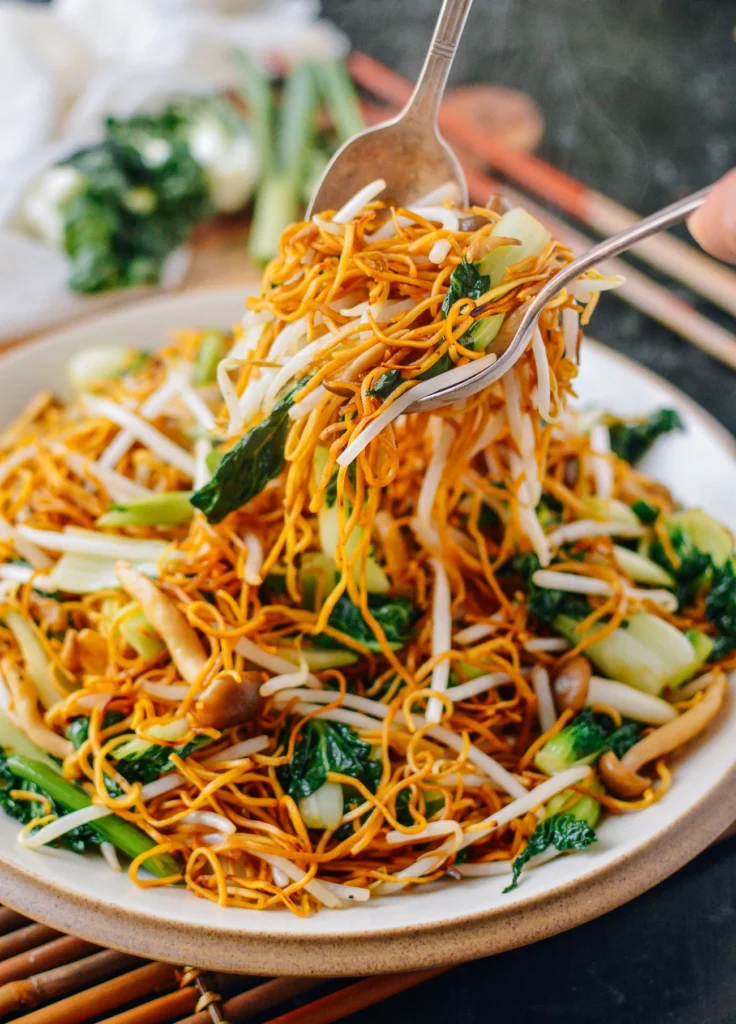
Now comes the flavorful part:
- Add the cooked noodles to the wok.
- Pour soy sauce, chili sauce, and vinegar over the noodles.
- Toss everything together gently for 2-3 minutes until the noodles absorb the sauce and flavors.
- Add a splash of sesame oil for aroma and richness.
Pro Tip: Keep tossing the noodles quickly to avoid clumping and ensure even coating of sauces.
Step 7: Garnish and Serve
The finishing touches elevate your dish:
- Sprinkle chopped spring onions over the top for a fresh, aromatic finish.
- Optionally, garnish with fried garlic or sesame seeds for added flavor.
Serve immediately while hot, alongside Manchurian sauce, chili sauce, or steamed dumplings for a full Indo-Chinese experience.
Pro Tip: Serve in a shallow plate to preserve the crispiness of the noodles.
Tips for Perfect Vegetable Hakka Chow Mein
- High Heat is Essential: Always stir-fry on high heat to achieve the restaurant-style wok flavor.
- Do Not Overcook Noodles: Slightly undercooked noodles yield a chewy texture after stir-frying.
- Use Fresh Veggies: Crisp, colorful vegetables make the dish both healthy and visually appealing.
- Balance Sauces: Adjust soy sauce, chili sauce, and vinegar to suit your taste — too much soy can overpower the flavor.
- Experiment with Proteins: Add tofu, paneer, or chicken for a non-vegetarian twist while keeping the stir-fry fast and easy.
Why You’ll Love This Recipe
Vegetable Hakka Chow Mein is:
- Quick and Easy: Ready in 20-25 minutes, perfect for busy weeknights.
- Flavorful: Savory, tangy, and mildly spicy flavors make every bite satisfying.
- Healthy: Packed with fresh vegetables and minimal oil, it’s a balanced meal.
- Customizable: Add your favorite veggies or proteins for a personal touch.
It’s no wonder that Hakka chow mein has become a staple in homes and restaurants across India and around the world. The dish delivers comfort, taste, and nutrition all in one.
Serving Suggestions
- Accompany with Sauces: Serve with schezwan sauce, chili garlic sauce, or sweet chili sauce for an extra flavor kick.
- Pair with Soup: Enjoy with hot and sour soup or sweet corn soup for a full Indo-Chinese meal.
- Family-Style Serving: Perfect for sharing — stir-fried noodles can be prepared in large batches for gatherings.
Storage and Reheating Tips
- Store leftovers in an airtight container in the fridge for up to 2 days.
- Reheat in a pan or wok on medium heat with a splash of oil to retain the noodle texture.
- Avoid microwaving directly, as it can make noodles soggy.
Final Thoughts: Make Restaurant-Style Hakka Chow Mein at Home
With this 7-step guide, you can now make crispy, flavorful Vegetable Hakka Chow Mein in the comfort of your own kitchen. From perfectly cooked noodles to freshly stir-fried vegetables and balanced sauces, this recipe brings the taste of Indo-Chinese street food straight to your dining table.
Whether you’re cooking for family, friends, or a cozy solo meal, this dish is quick, customizable, and packed with flavor. Next time you crave a restaurant-style chow mein experience, remember this step-by-step guide, and enjoy a bowl of golden, saucy noodles full of crunch and vibrant veggies.
